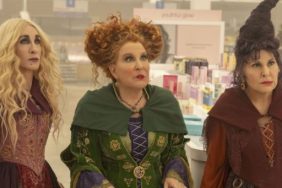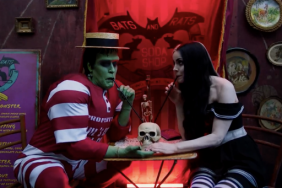On the last episode of The B-Movies Podcast, our proud 70th, William “Bibbs” Bibbiani and I had a very special gust in the cracklingly intelligent form of Ariel Schudson, a professional film archivist and a good friend of ours. In addition to having one of the coolest jobs ever (“film archivist” is right up there with “professional donut taster” or “Amber Heard’s bar of soap”), Ariel also curates, as we talked about on the show, a monthly film series at The New Beverly Cinema in Los Angeles called Something Old, Something New, wherein, as the name implies, an old classic is paired as a double feature with a more recent film. The purpose of this series is to introduce classics-addicted oldsters to the joys of more recent cinema they may have missed, as well as bring older films to the eyes of classics-averse or merely classics-uneducated kiddos.
Is this not the goal of every film critic, every film programmer, every film professor? To ensure that young people are seeing classics? I would say so. This is certainly my own goal when I write Free Film School articles: To ensure that certain people, provided they have the interest, are going to contemplate movies in a new way, and see classics they may not be familiar with. Maybe they’ll see something good. Perhaps they’ll see something great. Perhaps, and this is the greatest hope, they’ll see something so great that it changes the way they think about movies, and introduces them to a new way of thinking about the world.
Many young audiences, we lamented on Episode 70, tend not to reach back very far. I know this is true, because it’s what I did. Your average teenager will most likely, just out of habit, not bother to see any films made before the year of their birth. True, there are exceptions to this rule everywhere, but I’m willing to bet that an average 10th grade class in any high school in America couldn’t tell you who Jean Renoir is. Or Akira Kurosawa. Or Ingmar Bergman. Or even Werner Herzog. David Lynch and Stanley Kubrick maybe a bit more familiar.
The popular perception seems to be that (and this is not based on anything scientific) any movie made before, oh, 1977, is going to be distant, alien, and stodgy. It will not have the special effects, the action, the sex, nor the naturalist melodrama that the average moviegoer craves. Why 1977? That was the year Star Wars came out. For many, that was when cinema began.
This is such a pity, as there are so many treasures to be discovered, and so many pleasures to have from the first 70 years of cinema. The problem is you can’t plunk someone down in front of an obscure or obtuse masterpiece and have them naturally enjoy it. That’s more like homework than anything. It’s easy to see something “good,” it’s work to see something “great.” What we need are films that will appeal to anyone of any age. We need Gateway Movies. Films that, no matter when they were made or by whom, they will still enthrall. This sort of list does not necessarily include the greatest movies; I would argue that one needs to know about movies a bit before they hunker down to the works of Ozu or Bergman. Or even Citizen Kane or 2001: A Space Odyssey.
Well to teach you young whippersnappers a lesson, Bibbs and I have come up with a few titles apiece of older movies that hip young kids can throw on anytime, regardless of film education or disposition, and still enjoy. If you don’t know any of these movies, consider this list a “highest possible recommend” for you.
In no particular order:
Island of Lost Souls (dir. Erle C. Kenton, 1932)

One of the more bizarre and disturbing horror films of the 1930s, this adaptation of H.G. Wells 1896 sci-fi novel is notable in geek-rock hipster circles for being one of the primary inspirations for Devo (“Are we not men?”), as well as the primary lyric source for Oingo Boingo’s sub-hit No Spill Blood). The film follows a put-upon hero (Richard Arlen) who, through a cruel twist of fate, finds himself stranded on the island of the insidious Dr. Moreau (a delicious Charles Laughton), who has been using vivisection to “encourage” the local fauna to mutate into half-animal, half-human beasts. Dr. Moreau seemed to foresee Joseph Mengele, and Laughton’s cherubic face makes his sadistic smirk all the more disturbing. The animal beings themselves have arranged a human-like enclave, a parody really, led by a hairy Sayer of the Law (Bela Lugosi). The film is so sweetly sickening and straightforwardly horrifying, it still has the power to give anyone nightmares. What’s more, the sight of the animal people lurching about will sate the desire for creatures and special effects, even to those raised on a steady diet of CGI.
The Night of the Hunter (dir. Charles Laughton, 1955)

And speaking of Charles Laughton, the actor did, only once, try his hand at directing, and produced a bomb so notorious that it soured his taste for behind-the-camera antics altogether. This bomb, however, was soon recognized as a classic of suspense, and allowed the often creepy Robert Mitchum (who always struck me as being something of a child molester) to turn in one of his most impressive performances. If you like serial killer movies, The Night of the Hunter provides the boilerplate on which all movie killers thereafter – from Hannibal Lecter to the dude from Seven – were based. Mitchum plays Harry Powell, an evil holier-than-thou nut with the words “LOVE” and “HATE” tattooed across his knuckles; yeah, that’s where that came from. He marries a wealthy widow (Shelley Winters) for her money, kills her, and has to match wits with her two children to find where they hid the cash. The entire last act of the film is a taut chase scene with a terrifying killer chasing children. I defy your heart not to beat quickly.
Victim (dir. Basil Dearden, 1961)

In an age when gay rights are finally being openly discussed (and, in the best of cases, openly distributed), it can serve as a reminder to go back to the horror days of dark closets and blackmail. Basil Dearden’s 1961 film Victim, starring a wonderful Dirk Bogarde, is one of the earliest films to discuss homosexuality openly, and refer to blackmail as “the homosexual crime;” since most cases of blackmail at the time involved hidden sexuality. Bogarde plays a lawyer who specializes in blackmailers who victimize gays. He is also secretly gay himself, and ripe for his own inevitable blackmail case. Not only will modern audiences find the frank sex talk to be refreshing (no, not all older films are prudish), but Victim serves as an important lesson on the way sexuality was talked about in films. Timely, well-paced, well-acted, and discussing an important issue, Victim is one for anyone. It’ll start a conversation that ought to be had.
Anatomy of a Murder (dir. Otto Preminger, 1959)

Courtroom thrillers are always a good bet, and I have seen few better than Otto Preminger’s epic Anatomy of a Murder. This is a film that was made in the 1950s that uses words like “panties” and “rape” openly, and discusses the dodgy morals of revenge killing. Even if you don’t know big names like Jimmy Stewart, Ben Gazzara, George C. Scott, or Lee Remick… Even if you don’t know the jazz legend Duke Ellington… Heck, even if you’re not too familiar with the American criminal justice system… you will still get a thrill watching this taut legal drama of a man on trial for the murder of his wife’s rapist. The legal thrillers of John Grisham are the children of Anatomy of a Murder, only this film was there first, doing it better. The dialogue is flip and fast, it’s smart without sinking too low into shop talk, and it’s so frank about its violence and sex, you’ll be kind of taken aback at its vintage. It is long (at 160 minutes) and takes a while to get going, but the subtle, rapier-like discussions in the courtroom are witty and awesome.
Forbidden Planet (dir. Fred M. Wilcox, 1956)

So many sci-fi movies become so laser-focused on special effects and spectacle, we often forget that the spectacle should be used to service the material. For 1956, the legitimate classic Forbidden Planet not only has some truly breathtaking visuals (there is an animated monster, disintegrating cheetahs, an invisible beast leaving footprints in the sand before our very eyes, and an impressive and vast inner-planet chamber to rival anything in any sci-fi movie), but the visuals actually serve a purely sci-fi story of madness and science run amok. Commander J.J. Adams (Leslie Nielsen) has arrived on the faraway world to visit a human colony there, only to find the colony reduced to the ambitious Dr. Morbius (Walter Pidgeon) and his comely daughter (Anne Francis). There is a monster on the planet, you see, but there is a mystery as to how Morbius escaped its wrath. The true nature of the monster will shock you, and may even surprise you. In addition to being one of the best-looking sci-fi films you’ll see, it’s also a bit intense at the end. Yes, the outfits and technology are corny (Robbie the Robot looks cool to me, but may seem clunky and silly to most people), but the film is so good, the corny elements are easy to overlook. No sci-fi fan is complete without seeing this one.
All About Eve (dir. Joseph L. Mankiewicz, 1950)

If I were to tell you that this was a movie about the backstage workings and backstabbings of fickle Broadway stars in the 1950s, you may not have an interest. If I were to tell you that it is one of the bitchiest, campiest, wittiest, most acid-laced dramas this side of Neil LaBute, you may begin to take notice. If I were to add that there is a certain element of lesbian-coded soap-opera manipulation underneath every witty line of dialogue, you may be actually interested. If I were to tell you that it is one of the most dramatically powerful and fun-to-watch films of the decade, well, one would hope you’d be rushing off to watch it right now. If you thought films from the 1950s were clean and mannered, you clearly haven’t seen the bitchfest that is All About Eve, a movie about a young, doe-eyed and seemingly innocent upstart named Eve (Anne Baxter), and her wicked and insidious infiltration into the life of a suspicious aging actress (Bette Davis, seldom better). Who will be queen bitch? You’ll have to watch to find out. The entire film is narrated by a smarmy British theater critic (George Sanders) whose cynicism outstrips any modern action star. If you hate it, I’ll personally mail you your money back. Guaranteed.*
*The author may be lying.
Other honorable mentions I’d love to write about, but will leave here for now:
The Killing (dir. Stanley Kubrick, 1956)
12 Angry Men (dir. Sidney Lumet, 1957)
Shock Corridor (dir. Samuel Fuller, 1963)
Sweet Smell of Success (dir. Alexnader Mackendrick, 1957)
From the Desk of William Bibbiani:
First off, and I don’t really say this enough… Give it up for Witney, everybody. {Applause.) Hardest-working man at CraveOnline, right there.
But back to me. This week’s B-Movies Extended is an odd duck, because it wasn’t actually preceded by an episode. We recorded an episode, guest-starring the great Ariel Schudson of Something Old, Something New, but there was an unexpected technical issue that’s getting in the way. We’ll release the episode as soon as we can, I promise, but in the meantime, let’s get back on topic.
Classic movies. In my review of Coriolanus I recalled my high school English classes, when the packed rooms would fill with the moans of utter dread as Ms. Ivory doled out copies of Hamlet, Othello and everything else with the name “William Shakespeare” in the byline. The popular philosophy was that entertainment shouldn’t feel like work, which I’ll admit is up for debate, and that The Bard’s stories were hokey, antiquated, overly melodramatic, not enough action, not funny, too preachy, and my God, were they Philistines. But the point is, I’ve seen the same attitude over and over again from people my age or younger in regards to classic movies. And I can see why they’d feel that way. Older movies, even just a decade or two older, have a different feel than contemporary motion pictures. If you’re not used to something, even if it’s good, you might eschew it on principle. It’s the same reason why I’ve never eaten haggis.
So with that in mind, I’m just going to get right to my picks for Classic Movies for Hip Youngsters. If you’re not a fan of old movies, these are films that should slip right down your gullet without activating your gag reflex. The drama, the performances, the story, the excitement not only works today, it also works in a fairly modern context. With one major exception, I’m leaving off a lot of classics (because you already know you should see Psycho right?) and focusing on films you can feel like you discovered.
The Most Dangerous Game (dirs. Irving Pichel & Ernest B. Schoedsack, 1932)

The Most DangerousGame is one of the most frequently ripped-off movies in history. Stop me if you’ve heard this one: a big game hunter, bored after years of honing his craft, decides to hunt humans instead. Hard Target, The Running Man, episodes of “Batman: The Animated Series,” “Star Trek,” “Buffy the Vampire Slayer” and even “Gilligan’s Island” have all stolen the concept at one time or another, but call me crazy: there’s nothing like the original. Leslie Banks stars as Count Zaroff, a madman with a jungle island who traps ships off his shores and forces their stranded passengers to be his prey. Joel McCrea and Fay Wray are his latest victims, but McCrea is also playing a skilled hunter, so the tide finally turns against Zaroff in a fantastic battle of wits and spears. Oh, and if the sets look familiar, there’s a good reason: The Most Dangerous Game was shot on the same sets as King Kong, in an attempt to make a little extra money off of the extremely expensive blockbuster. Thanks to the cost-cutting measures, The Most Dangerous Game actually made a greater profit than Kong did. Lean, mean and still startlingly effective action filmmaking.
Young Mr. Lincoln (dir. John Ford, 1939)

Abraham Lincoln: Vampire Hunter sounds like a neat bit of historical fiction, doesn’t it? The Great Emancipator fighting vampires is a pretty cool concept. Well, in 1939 director John Ford (The Searchers) cast the great Henry Fonda as Abraham Lincoln as the defense attorney in a murder investigation… and it’s all true. Well, mostly: Young Mr. Lincoln moves the trial back in time a bit, changes the names and details and gives in to some odd Mary Sue moments, like when the 16th president writes the famous song “Dixie,” but it’s close enough for government work. Two brothers are accused of murdering a man in a barroom brawl, and it’s up to Abraham Lincoln to save them from a lynch mob and prove their innocence in court. Lincoln’s famous way with words comes into play in the fantastic climactic interrogation sequence that reads like a precursor to every great courtroom movie that came after it. Not terribly famous, but available in a sweet Criterion Collection release, Young Mr. Lincoln made history fun years before it became fashionable.
The Unknown (dir. Tod Browning, 1927)

Classic movies aren’t usually known for being totally f*cked up, but The Unknown certainly qualifies. A silent from director Tod Browning, who more famously gave the world Dracula and Freaks, the film stars Lon Chaney Sr. as Alonzo the Armless, a knife thrower in the circus with – you guessed it – no arms. He’s in love with the circus owner’s daughter, played by a then-unknown Joan Crawford, who can’t stand to be touched. It’s a match made in heaven, right? Try hell: Alonzo actually has both of his arms, and is in fact a dangerous criminal hiding from the police. He absconds to get his arms surgically removed for real, only to discover upon his return that Crawford has overcome her fears and fallen in love with the circus strongman, leading to one of the most bravura horror climaxes of all time, in which Alonso plans to rip off her lover’s arms in an incredibly extravagant public display. If you think you couldn’t sit through a silent movie, The Unknown would be a pretty sweet film to start with.
Hail the Conquering Hero (dir. Preston Sturges, 1944)

Preston Sturges made some awesome movies. You may have heard someone raving about Sullivan’s Travels sometime, if only because of its connection to O Brother, Where Art Thou?, and The Palm Beach Story, Unfaithfully Yours and The Great McGinty should be on your “must watch” list as well, but if any of his films has aged perfectly, it’s Hail the Conquering Hero. Eddie Bracken stars as Woodrow Truesmith, who was discharged from the Marines because of a hayfever, never having seen action in World War II. Ashamed to go home, he runs into a bunch of friendly soldiers who convince him to make up a harmless story about being wounded in action. And since it’s a comedy, that one white lie spirals out of control into a series of hilariously awkward situations, like when he’s inadvertently forced to run for mayor. After a while, the lie gets so big that nobody will listen to him when he tells the truth. People just believe what they want to believe. This kind of crackerjack screwball comedy still gets made today, only with half the wit and tons of fart jokes. It would be hilarious if it were made yesterday.
Casablanca (dir. Michael Curtiz, 1942)

If any classic movie ever lived up to the all the hype, it’s Casablanca. I should know. I resisted the call to watch Michael Curtiz’s iconic romance for many, many years. I knew all the quotes (“Round up the usual suspects,” “This looks like the beginning of a beautiful friendship,” “Here’s looking at you, kid,” and the list goes on), and I pretty much knew the plot through decades of cultural osmosis, so it always seemed like a low priority. But then I popped that sucker in our old VCR and holy crap, is this movie really f*cking good. Humphrey Bogart stars as a pragmatist in World War II. He lives in a city populated by Nazis and refugees alike, and appeases all sides just to keep himself out of trouble. But when his old lover Ingrid Bergman comes back into town, and married to a revolutionary leader (Paul Henreid), the hero is forced to decide whether he should help them or help himself to the woman he’s been missing for years. The Nazis act like an ever-tightening noose around the film, but Casablanca really shines because its characters are so much stronger than most of the on screen heroes today. They have interesting points of view, cultivated out of years of emotional turmoil, and they’re constantly at odds between their personal desires and whatever they consider moral. The result is a love story that could never be, but feels like it surely must. With Nazis.






